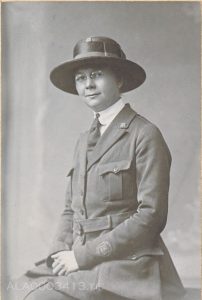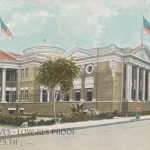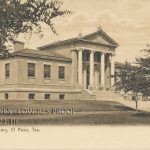While most of the American Library Association Library War Service’s efforts were concentrated in camps and hospitals in the United States and Europe, there was also a need for books for the soldiers stationed along the Mexican border. Chalmers Hadley, the librarian of the Denver Public Library, surveyed the desire for books among soldiers at the border and found them wanting.
In early 1918, Hadley observed that, “It is vastly different to find thousands of men requesting books, and hanging on a promise of some … It will be a great misfortune to the men and a lost opportunity to the A.L.A. if the traveling libraries are not provided.” [1] To satisfy the demand for books, two traveling libraries were established by the ALA and headquartered in the San Antonio Carnegie Library and at the El Paso Public Library in Texas.
The El Paso location was managed by Ethel McCollough of Evansville, Indiana, and the San Antonio location was managed by Harriet C. Long, a librarian from the Van Wert Public Library in Ohio. While there isn’t much written on the librarians along the border and the reports were often vague, details of the work can be found in Long’s letters to her family. In those letters she described her duties, her struggles in organizing and shipping books, and her day to day interactions with soldiers and other librarians.

The importance of her work was reflected in Long’s interactions with a colonel stationed at Fort Brown at Brownville, Texas. The colonel, with a reputation for being harsh, demonstrated the desire for books by his men when he spoke to Long. Long wrote of the interaction, “When I said that I came out to find out how things were going, and what we could do more he immediately said ‘Don’t ever send any fewer; we need them all.’” [2]
However, the books that were so desperately wanted by soldiers sometimes encountered mishaps, creating trouble for Long. She noted in one letter that six of 350 books she sent to Fort McIntosh reached the fort and the rest ended up in the town library. Long wrote, “I had to get on my knees and explain to the town librarians, and take those books back to the fort, and start over again. But these two months I thought Fort McIntosh well care for, and here I was sadly disillussioned [sic].” [3]
One of Long’s letters also described the bookmobile the library was using and the process of manning the truck. Her letter provides an insight on how the ALA was reaching soldiers in remote corners of the country during the war that were otherwise unnoticed:
The Library Ford Truck has been equipped with book cases on each side, and several hundred books can thus be taken over the field, for the men to choose from. It takes one person to discharge the books as the men return them, and one person on either side of the truck at the book shelves to help the men select them and to charge the books. Usually they circulate 200 books in less than two hours. [4]
Long stayed in El Paso until 1919, when she transferred over to Europe. By then there were over 150 library stations along the Mexican border. [5] In a 1919 report to the Association, the work of Long and her colleague, Ethel McCollough, along with many others who helped them, were briefly summarized in two sentences, “Nor were the men doing monotonous guard duty on the Mexican border forgotten. To them traveling libraries from the Association headquarters at El Paso and San Antonio came as a great boon.” [6] While the report provides no substance to the library work done along the Mexican border, Long’s letters in the American Library Association Archives provide a clearer picture and evidence of her and her colleagues’ efforts.
“There is no frigate like a book
To take you leagues away
Nor any courser like a page
Of prancing poetry.
This solace may the poorest take
Without oppress or toll
How frugal is the chariot
That drives the human soul.” [7]
- “Mexican Border,” War Library Bulletin, pg. 7, April 1918, vol. 1, no. 6
- Harriet C. Long to Family, July 28, 1918, Harriet C. Long Papers, Record Series 89/1/27, Box 1, Folder: Correspondence – Texas, 1918, American Library Association Archives at the University of Illinois at Urbana-Champaign.
- Harriet C. Long to Family, August 18, 1918, Folder: Correspondence – Texas, 1918, RS 89/1/27-1.
- Harriet C. Long to Family, August 5, 1918, Folder: Correspondence – Texas, 1918, RS 89/1/27-1.
- “Summary of Library War Service,” War Library Bulletin, May 1919, vol 1, no. 9, pg. 3.
- A. H. Shearer, “Historical Sketch of the Library War Servce,” Papers and Proceedings of the Forty-First Annual Meeting of the American Library Association (Chicago, 1919), pg. 230, Record Series 5/1/2, American Library Association Archives at the University of Illinois at Urbana-Champaign.
- Manual for use in Branch Libraries of American Library Association Mexican Border Traveling Library Service, Harriet C. Long, September 1918, Folder – Harriet C. Long Papers, 1918-1920, RS 89/1/27-1.

